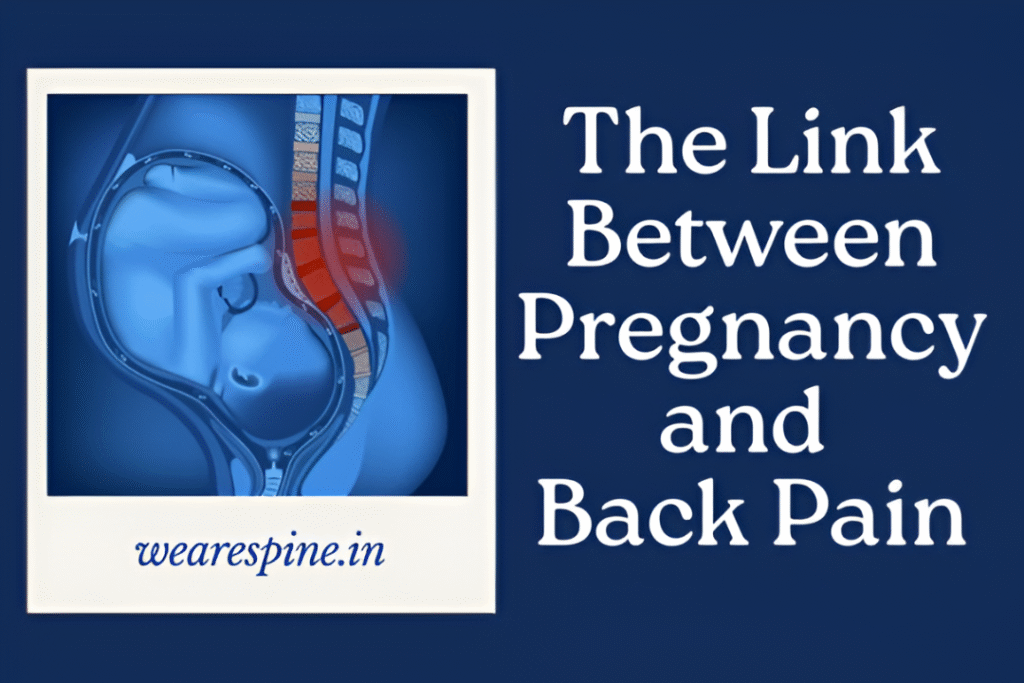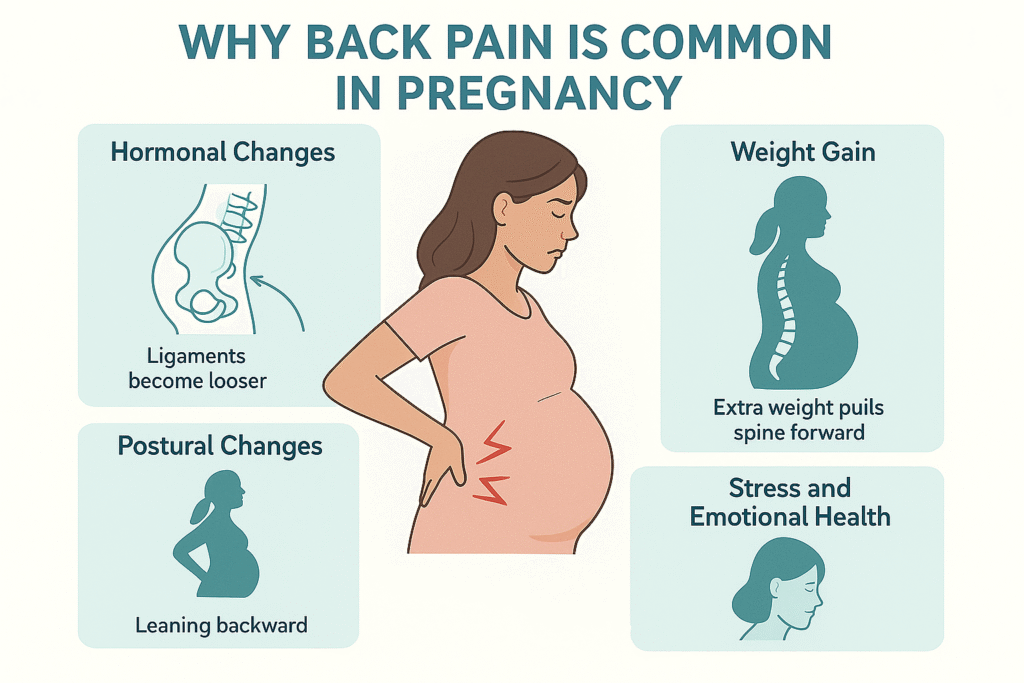
Pregnancy is often described as one of the most beautiful journeys in a woman’s life. The anticipation of bringing new life into the world fills homes with excitement, dreams, and prayers. But alongside the joy, many expecting mothers face a quieter, often overwhelming struggle: back pain.
In India, where family structures are deeply interwoven, pregnant women are often told, “Back pain is normal, just bear with it.” But the truth is, while mild discomfort is common, persistent or severe back pain should never be dismissed. It is not only about temporary discomfort — it may affect sleep, mobility, mental health, and even long-term spinal health.
This blog explores the science behind pregnancy-related back pain, the physical and emotional challenges women face, and practical, evidence-based solutions for relief. Whether you are an expecting mother, a new parent, or someone supporting a loved one, this guide will help you understand and address this issue with empathy and knowledge.
Why Back Pain Is So Common in Pregnancy
Studies suggest that 50–70% of pregnant women experience some degree of back pain during their pregnancy. But why does it happen? The answer lies in a complex mix of hormonal, mechanical, and lifestyle factors.
1. Hormonal Changes
- During pregnancy, the hormone relaxin increases to loosen ligaments in preparation for childbirth.
- While essential, this also makes joints less stable, especially in the pelvic and lumbar (lower back) region.
- This instability can lead to strain and pain in the back.
2. Weight Gain
- A healthy pregnancy often results in 10–15 kg of weight gain.
- This added weight, especially around the abdomen, shifts the body’s center of gravity forward, forcing the spine to arch more than usual (lordosis).
- This posture places stress on the lower back muscles and ligaments.
3. Postural Changes
- Many pregnant women instinctively lean backward to balance their growing belly.
- This posture increases pressure on spinal joints and discs, leading to pain.
4. Muscle Separation (Diastasis Recti)
- The growing uterus can sometimes cause abdominal muscles to separate, reducing core strength.
- A weaker core forces the back muscles to compensate, increasing the risk of pain.
5. Stress and Emotional Health
- Emotional stress is often overlooked, but it can cause muscle tension, especially in the back and neck.
- Anxiety about childbirth, work, or family responsibilities may worsen back discomfort.

Types of Pregnancy-Related Back Pain
Back pain in pregnancy is not the same for every woman. Doctors typically classify it into two categories:
- Felt around the waist and lower spine.
- Similar to common lower back pain but worsens with prolonged standing or lifting.
- Often linked to postural strain and increased lumbar curvature.
- Located deep in the buttocks, hips, or the back of the thighs.
- Usually more intense than lumbar pain.
- Triggered by walking, climbing stairs, or rolling over in bed.
- Often mistaken for sciatica, but it has different underlying causes.
Early Signs of Back Pain in Pregnancy
Recognizing the early warning signs is essential to prevent worsening of the condition. Some common early indicators include:
- A dull ache in the lower back after standing for long periods.
- Sharp pain when changing positions (e.g., turning in bed).
- Stiffness in the morning or after prolonged sitting.
- Pain radiating into the hips or thighs.
- Increased discomfort in the evening after daily chores.
If ignored, these early signs may progress into more chronic pain, lasting well beyond delivery.
Emotional Toll: More Than Just Physical Pain
Back pain during pregnancy is not only a physical challenge. It deeply impacts emotional and mental well-being:
- Interrupted Sleep: Pain often worsens at night, making it hard to rest.
- Work Struggles: Many women continue working during pregnancy, and desk jobs or long commutes add strain.
- Guilt and Worry: Mothers sometimes feel guilty for not being “strong enough,” though the pain is not their fault.
- Fear of Delivery: Concerns about whether back pain means complications during labor are common.
Understanding these emotional aspects is critical. Pregnant women need support, reassurance, and practical help — not dismissive comments.
Not every expecting mother will have severe back pain, but certain risk factors raise the likelihood:
- Previous history of back or pelvic pain.
- Sedentary lifestyle or lack of exercise before pregnancy.
- Carrying multiple babies (twins, triplets).
- Poor posture and ergonomics.
- Overweight or obesity before conception.
- Physically demanding work.
- Emotional stress and anxiety.
Safe Remedies for Pregnancy-Related Back Pain
When pain strikes, many women hesitate to take medicines due to concerns about the baby’s safety. Fortunately, there are several safe, non-pharmacological remedies.
1. Exercise and Stretching
- Prenatal yoga and pelvic tilts strengthen core muscles.
- Gentle cat-cow stretches reduce spinal stiffness.
- Walking remains one of the safest, most effective exercises.
2. Good Posture
- Stand tall, shoulders back, and avoid locking knees.
- Sit with a straight back, supported by a small pillow or cushion.
- Avoid crossing legs while sitting for long periods.
3. Sleep Position
- Doctors recommend sleeping on the left side with a pillow between the knees.
- A firm mattress or pregnancy pillow can provide extra support.
4. Heat and Cold Therapy
- A warm compress can relax tense muscles.
- Cold packs may reduce inflammation.
- Always use moderate temperatures to avoid harm.
5. Support Belts
- Maternity belts or belly bands can reduce strain by supporting the belly and back.
6. Footwear
- Avoid high heels; use cushioned, supportive shoes.
- Standing barefoot on hard floors for long periods should also be avoided.
When Back Pain Needs Medical Attention
While mild pain is common, certain symptoms require urgent medical evaluation:
- Pain accompanied by fever or chills.
- Severe pain that does not improve with rest.
- Numbness, tingling, or weakness in the legs.
- Loss of bladder or bowel control.
- Sudden sharp pain after a fall or injury.
These could signal more serious conditions, such as herniated discs, infections, or nerve compression, which need specialist care.
Postpartum Back Pain: Why It Lingers
For many women, back pain doesn’t disappear after delivery. Reasons include:
- Hormones like relaxin remain elevated for weeks after childbirth.
- Lifting and nursing a newborn strain the spine further.
- Lack of core strength post-delivery prolongs recovery.
- Cultural practices (e.g., sitting on the floor for feeding) can worsen pain if not done carefully.
Postpartum spine care is just as crucial as prenatal care.
Practical Tips for Indian Mothers
Indian cultural practices around pregnancy and postpartum care offer both benefits and challenges:
- Oil massages: Traditionally given to new mothers, they may help relieve muscle tension.
- Sitting on the floor: While culturally common, it can strain the back if posture is poor.
- Carrying heavy household loads: Many women return to chores too quickly, which worsens pain.
- Vegetarian diets: Ensure adequate calcium, vitamin D, and protein through dairy, legumes, and fortified foods.
Awareness and balance are key — combining cultural wisdom with medical advice ensures better outcomes.
Preventing Back Pain: A Lifelong Gift
Pregnancy can be the start of better spine health practices for life. Preventive steps include:
- Building core strength before conception.
- Maintaining a healthy weight.
- Following safe lifting techniques (bend knees, not the back).
- Incorporating daily stretches and walks.
- Staying emotionally supported through family and healthcare guidance.
Conclusion: Embracing the Journey with Strength and Care
Pregnancy transforms not only a woman’s body but also her heart and mind. Back pain, though common, should never be dismissed as something to “just live with.” Understanding the causes, recognizing early signs, and seeking timely care can make this journey smoother and safer.
For Indian mothers especially, where cultural traditions meet modern medical insights, the right balance can bring comfort and confidence. With awareness, care, and support, every expecting woman can embrace motherhood with less pain and more joy.